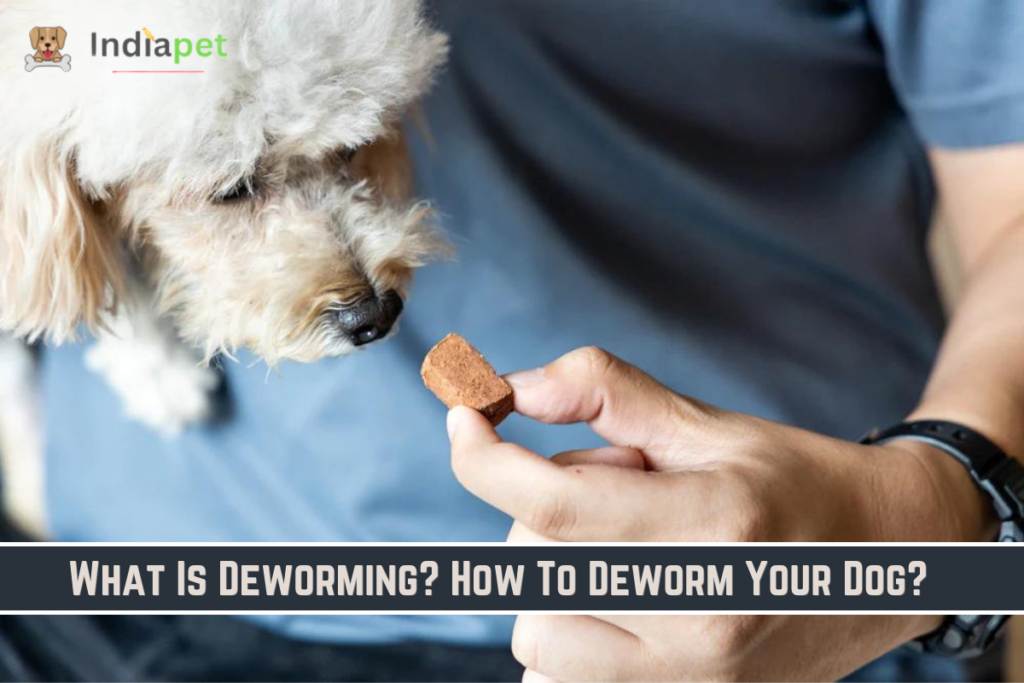What Is Deworming? How To Deworm Your Dog?: As responsible dog owners, we strive to provide our furry friends with the best care possible. Part of that care involves ensuring they stay healthy and free from parasites. One essential aspect of this is deworming. Whether you’re a seasoned pet parent or new to the world of dog ownership, understanding what deworming entails and how to go about it is crucial for your pet’s well-being.
What Is Deworming? How To Deworm Your Dog?
What is Deworming?

Deworming is the process of eliminating intestinal parasites, such as worms, from your dog’s body. These parasites, including roundworms, tapeworms, hookworms, and whipworms, can pose serious health risks to your pet if left untreated. They can cause symptoms ranging from mild discomfort to severe illness and can even be fatal in extreme cases.
Why is Deworming Important?

Even if your dog appears healthy and shows no visible signs of a worm infestation, they may still be carrying parasites. Worm eggs or larvae can be present in their environment, such as soil, grass, or feces, and can easily be ingested by your pet during daily activities like grooming or playing. Regular deworming helps prevent the buildup of parasites and protects your dog’s health.
People Also Read: Why Dogs Love Belly Rubs? – Know the Reasons
Signs Your Dog Needs Deworming
While some dogs may show obvious symptoms of a worm infestation, such as vomiting, diarrhea, weight loss, or a dull coat, others may exhibit more subtle signs or none at all. Therefore, it’s essential to follow a deworming schedule recommended by your veterinarian, rather than waiting for symptoms to appear.
How to Deworm Your Dog

- Consult Your Veterinarian: Before starting any deworming treatment, consult your veterinarian. They can recommend the most suitable deworming schedule and products based on your dog’s age, health status, lifestyle, and risk factors.
- Choose the Right Dewormer: There are various deworming products available, including oral medications, topical treatments, and injections. Your veterinarian can help you select the most effective and safe option for your dog.
- Follow the Recommended Schedule: Deworming is not a one-time event but rather a regular preventive measure. Your veterinarian will advise you on how often to deworm your dog based on factors such as their age, lifestyle, and risk of exposure to parasites.
- Administer the Dewormer Properly: Follow the instructions provided by your veterinarian or the product manufacturer carefully when administering the dewormer to your dog. Ensure you give the correct dosage based on your pet’s weight and follow any specific administration guidelines.
- Monitor for Side Effects: While most deworming medications are safe when used as directed, some dogs may experience side effects such as vomiting, diarrhea, or allergic reactions. If you notice any adverse reactions after deworming your dog, contact your veterinarian immediately.
- Prevent Reinfestation: To reduce the risk of your dog becoming reinfected with worms, practice good hygiene and sanitation measures. Clean up your dog’s feces promptly, regularly disinfect their living area, and avoid allowing them to roam in areas where parasites are prevalent.
- Regular Veterinary Check-ups: Schedule regular veterinary check-ups for your dog to monitor their overall health and discuss any concerns or changes in their behavior or appearance, including signs of a worm infestation.

Remember, Friends!
- Deworming is like a superhero helping our doggies stay healthy and strong!
- Always listen to the doggy doctor’s advice – they know what’s best for our furry friends!
- Being a good doggy owner means taking care of our doggies and keeping them safe and happy!
So, next time you see your furry friend wagging their tail, remember to give them lots of love and care, and don’t forget about deworming to keep them feeling their best!


